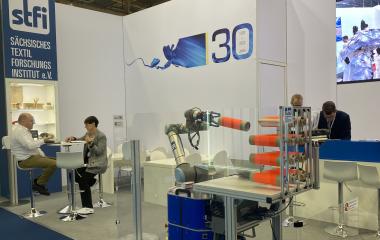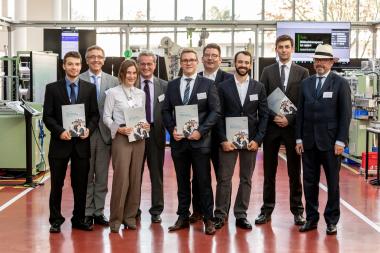STFI: Highlights of textile research at Techtextil 2024
STFI will be presenting high-end textile products and solutions at Techtextil 2024. The highlights from current research results and innovations provide an insight into the digitalisation of textile production, show applications for 3D printing and smart technical textiles and provide examples of particularly sustainably designed products as well as innovative approaches for protective and medical textiles.
The central highlight of STFI's presence at Techtextil is a robot system that demonstrates the automated processing of a bobbin frame on a small scale. The pick-and-place application demonstrates camera-supported gripping of the bobbins. The robot is part of the STFI's “Textile Factory of the Future” which demonstrates automation solutions for the textile industry in a laboratory environment.
From the field of sustainable products and solutions, a sleeping bag with bio-based and therefore vegan filling material and a natural fibre-based composite element for furniture construction, in which LEDs and capacitive proximity sensors for contactless function control have been applied using embroidery technology, will be on show. Printed heating conductor structures demonstrate current research work for the e-mobility of the future, as the individually controllable seat and interior heating should ultimately reduce weight and save energy compared to conventional heating systems.
While a protective suit for special task forces protects against the dangers of a Molotov cocktail attack, a shin guard and a knee brace with patellar ring illustrate the process combination of 3D printing and UV LED cross-linking. Other highlights from lightweight textile construction include the rib of a vertical rudder of an Airbus A320 and a green snowboard made from recycled carbon fibres.
Sächsisches Textilforschungsinstitut e.V. (STFI)










